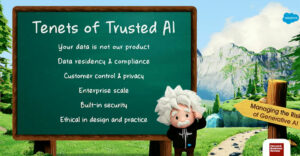One of the knocks against Salesforce about a year ago was how it had bought up a number of companies and had not (yet) done a good job of integrating them. Sharks were circling, and private equity investors were offering free advice about how the company could help them become even richer.
A popular, if not very original, idea was to stop buying companies to let more cash fall to the bottom line. Then, Salesforce could be just like other exchange-traded software companies. Gee.
That was so long ago.
At Dreamforce, the kindness was repaid as Salesforce rolled out its new platform, Einstein 1. As I think about the keynote, it appears that the coming together that the PE crowd pined for has arrived and that the pining might have just been premature or maybe just a bit off target.
Artificial intelligence is showing itself to be the glue that will hold many vendors’ offerings together for the foreseeable future, making Salesforce’s acquisition strategy look crazy — like a fox. But more than that, Salesforce demonstrated how AI will be the tool that launches millions of new business processes while bringing together many businesses’ entire IT portfolios.
Einstein 1
In Einstein 1, Salesforce has launched a platform designed around AI. By combining its CRM apps with Data Cloud, generative AI, and Einstein AI, it has provided an application environment that, through generative AI, produces apps that get business done without code and on the fly. From what I can tell, doubling down on metadata and combining it with generative AI was the trick.
The company is coming very close to being able to say that regardless of what incumbent software vendors are already in a business’s portfolio, Salesforce should be there, too. There is no data source that Salesforce can’t access, no LLM (large language model) it can’t play nice with, and no database that’s foreign to it. Because of this, Salesforce seems poised to be the adhesive holding together every company’s IT effort.
It’s entirely possible that other vendors can and will deliver similar functionality. After all, it’s in the zeitgeist. But the thing that Salesforce continues to leverage since its founding is its first mover advantage, and we’ve seen that it takes a lot to dislodge the first mover once it has a foothold.
We are not talking about general-purpose CRM or even CRM per se. The AI and generative aspects of Einstein 1 are applicable throughout the front and back offices through every vendor on the AppExchange.
Salesforce has a broad range of solutions for the telco industry, finance and banking, health care, and more. The power of generative AI and the company’s doubling down on metadata means that the new technologies will ripple through its suite of offerings as well as those of its app development partners in short order, thus enhancing the ecosystem.
AI and Back-Office Dynamics
It’s a good business strategy for partners to develop solutions that are adjacent to Salesforce, which Salesforce has little or no interest in, which brings us to the back office.
I can’t say that Salesforce or its partners will become major back-office players because that’s a crowded marketplace, and none of them is exactly in a first-mover position.
However, the existence of AI has so rapidly changed the industry that it is likely to cause a leadership shakeup in application areas that have been stable for a very long time. Rather than stability, it’s all about getting there first with the best solution, a good reason to rely on generative AI. So, I’d look for more news from the back office in the months ahead.
That’s what is so interesting about Dreamforce this year. We may be living through an inflection point that reshuffles everything, but we’ll need some distance from the event to know for sure.
Personally, I believe that, if only because I thought we’d gotten as close to our industry’s asymptote as we likely could, a reshuffling of some kind was necessary. AI is foundational in that regard. Salesforce has put itself and its partners on a new foundation, which means we all need to remember what it’s like to be first movers or at least fast followers.


























































